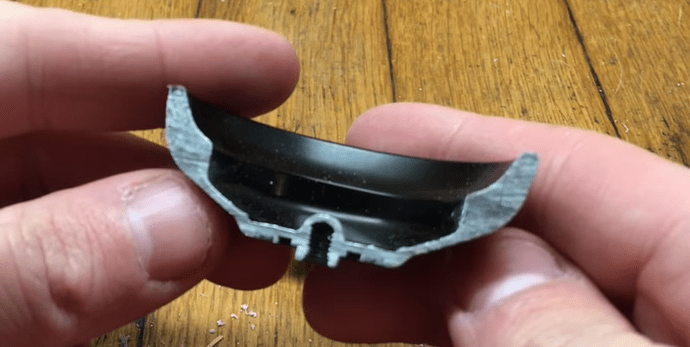Are these the same guts as the Diffraction?
Oh ya I guess they are the same guts as the diffraction lel
Yeah, pretty close at least. I think I re-drew the response pad area a couple times. These guts came from Jordan of Smashing yoyos, who lent his important advice and expertise to my project.
Was thinking about mirror-polished aluminum - maybe polishing the cup is going to be the next cool thing? There’s a YYF yoyo called the Equilateral that had a separate mirror piece attached in the middle, but polishing the aluminum would be more durable and also allows for a larger polished section.
I chose this shape because it allows for a large, flat cup without adding too much center-weight.
Nice! Is this fitted for a 10 mm or 8 mm axle?
This one is 10mm - I’m gonna work on the shape/weight a bit more then post full specs
Mirror center has been done in plastic, but only with stickers of course.
Would mirror polishing without anodizing last on Alu though? Does mirror polish (no anodizing since it’s just polished) tarnish on Alu? ![]()
I’m figuring on using these size C guts what axle are they sized for
oh, the guts I posted earlier… not sure I remember the axle length. but you can adjust it by changing the length of the axle hole, then check the distance from the center plane. You want probably .2mm clearance.
Well I wanted to know both lol thank you mate
np. if you post your design later (or even just part of it) I can give feedback, too.
I think you can do it, but with a different process than normal anodization. I’ll have to ask around.
Found these really old-school looking forums that have lots of great info: Process for aluminium reflectors; anodizing polished aluminum
Seems like you’d need to polish the aluminum and then do a pretty thin anodization layer if you want actual mirror properties. I think you could do this in yoyo form by polishing the cup, masking it off before any other surface treatment (bead blast, tumbling, etc) then do the anodization, then mask that area again and dye it. Seems tricky! Maybe you could anodize the entire thing then grind the anodization off of the cup area and polish it and just leave it raw.
Thanks to Mark who graciously and patiently walked me through the process of designing a yoyo in Fusion 360, I present to you: The ParDeck [lol]
It is a fusion of two of my favorite yoyos, the profile of a Parlay [With sliiight response bump, schmoove grooves and sliiightly higher walls] and the [similar] weight dist. of a Top Deck. Also, I modified the nipple in the cup to a little spike. It’s a supercharged classic!
| Specs | Parlay Deck |
|---|---|
| Material | AL7075 |
| Diameter | 55.41mm |
| Width | 42.79 mm |
| Weight | 66.41 g |
| Ixx | 15,870 |
This whole process was pretty neat!
Wow that looks amazing!
Love the idea, but judging by that CAD drawing it will have some wobble.
Wobble? Explalin…
There’s a hugely thick area after a very thin area. This can have problems.
This really depends on the tolerances your machinist can get to. Most modern competition bimetals have a similar change in density near the rims that can lead to bad vibe if the tolerances there aren’t just so. I feel like it’s reasonable for a monometal, though it depends on the minimum thickness in that thin area. Too thin and it can flex during the turning operations.
What’s the fillet radius on your rim? It looks like it could use a little more rounding off - probably 1.0mm at least.
Looks great otherwise, though!






